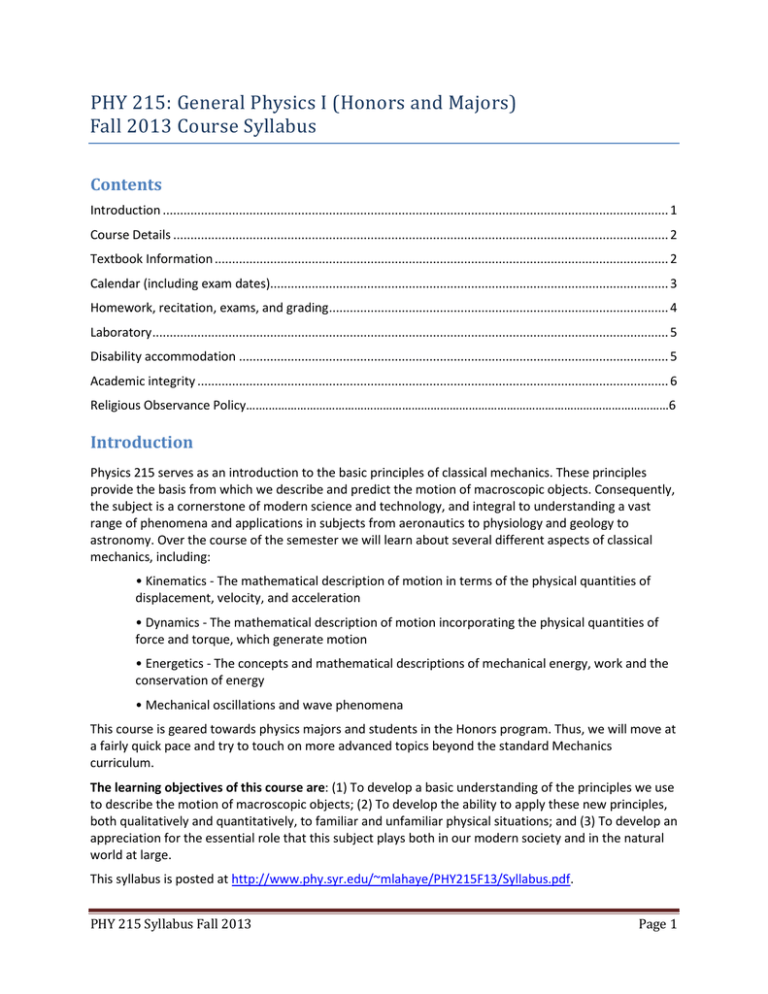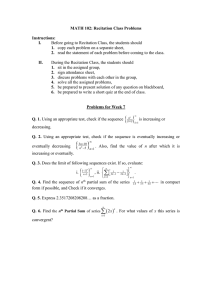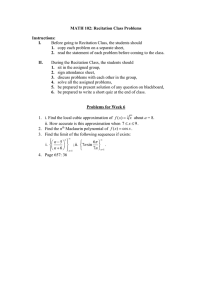
PHY 215: General Physics I (Honors and Majors)
Fall 2013 Course Syllabus
Contents
Introduction .................................................................................................................................................. 1
Course Details ............................................................................................................................................... 2
Textbook Information ................................................................................................................................... 2
Calendar (including exam dates)................................................................................................................... 3
Homework, recitation, exams, and grading.................................................................................................. 4
Laboratory ..................................................................................................................................................... 5
Disability accommodation ............................................................................................................................ 5
Academic integrity ........................................................................................................................................ 6
Religious Observance Policy….…………………………………………………………………………………………………………………6
Introduction
Physics 215 serves as an introduction to the basic principles of classical mechanics. These principles
provide the basis from which we describe and predict the motion of macroscopic objects. Consequently,
the subject is a cornerstone of modern science and technology, and integral to understanding a vast
range of phenomena and applications in subjects from aeronautics to physiology and geology to
astronomy. Over the course of the semester we will learn about several different aspects of classical
mechanics, including:
• Kinematics - The mathematical description of motion in terms of the physical quantities of
displacement, velocity, and acceleration
• Dynamics - The mathematical description of motion incorporating the physical quantities of
force and torque, which generate motion
• Energetics - The concepts and mathematical descriptions of mechanical energy, work and the
conservation of energy
• Mechanical oscillations and wave phenomena
This course is geared towards physics majors and students in the Honors program. Thus, we will move at
a fairly quick pace and try to touch on more advanced topics beyond the standard Mechanics
curriculum.
The learning objectives of this course are: (1) To develop a basic understanding of the principles we use
to describe the motion of macroscopic objects; (2) To develop the ability to apply these new principles,
both qualitatively and quantitatively, to familiar and unfamiliar physical situations; and (3) To develop an
appreciation for the essential role that this subject plays both in our modern society and in the natural
world at large.
This syllabus is posted at http://www.phy.syr.edu/~mlahaye/PHY215F13/Syllabus.pdf.
PHY 215 Syllabus Fall 2013
Page 1
Course Details
Instructor
Matthew LaHaye, Assistant Professor of Physics. E-mail: mlahaye@syr.edu.
Telephone: 315-443-2564. Office and hours: 209 Physics Bldg. Mondays and
Wednesdays, 4:00-5:00 PM; you can also drop by at your convenience, or make a
specific appointment.
Teaching
Assistant
Lecture times
Prashant Mishra.
Office: 310 Physics Building
E-mail: prmishra@syr.edu
Tuesdays & Thursdays, 11:00AM – 12:20 PM, Rm. 104N, Physics Bldg.
Credits
3
Co-requisites
(i) PHY 221 (General Physics I Laboratory) (ii) MAT 286 or MAT 295.
Recitation
Your recitation section will meet twice weekly for 55 minutes at a time and place
in the Physics Bldg. to be determined.
Getting forms
signed
To add or drop this course, please contact Patricia Whitmore. E-mail:
pawhitmo@syr.edu. Room 111.
Blackboard
Course information, including assignments, announcements and grades, will be
posted at Syracuse University’s blackboard website http://blackboard.syr.edu/
Web Page
Assignments will also be posted on the course web page
(http://www.phy.syr.edu/~mlahaye/PHY215F13/).
Mastering
Physics (MP)
MP can be accessed at: http://www.pearsoncustom.com/ny/su_physics/.
The course ID is: LAHAYEPHY215.
Physics clinic
A physics clinic is operated in room 104S of the Physics Bldg. You can drop by to
get help with physics problems. The clinic hours are posted here:
http://web.physics.syr.edu/undergraduate/current-courses.html. The clinic is
staffed by the recitation instructors, who do not usually have separate office
hours.
Textbooks, Workbooks & Mastering Physics Student Access Code
(i)
(Required) Physics for Scientists and Engineers: A Strategic Approach. Volumes I & III (Third
Edition). Randall D. Knight (Pearson/Addison-Wesley 2013). ISBN 978-0-321-75291-8 and ISBN
978-0-321-75317-5 respectively.
(ii)
(Required) The corresponding Student Workbooks for Vol. I and Vol. III of the text (ISBN 978-0321-75314-4 and ISBN 978-0-321-75312-0 respectively).
(iii)
(Optional)Mastering Physics Student Access Code (ISBN 978-0-321-75304-5). The student
access code will enable you to log in to MP and access additional problems as well as work
through many helpful tutorials related to the material covered in the course.
(iv)
The three items above can also be purchased bundled together at the SU Bookstore for a
reduced price. Free-standing copies of each item may also be purchased at the Bookstore.
PHY 215 Syllabus Fall 2013
Page 2
Calendar (including exam dates)
The Date indicated in the table is the date of the Tuesday lecture in each week. The lecture topics on
this calendar are provisional, and may change during the semester. Under Topic, the numbers in
parentheses are the corresponding chapters in the text.
Week Date
Topic
1
08/27
2
09/03
3
09/10
4
5
09/17
09/24
6
10/01
7
8
10/08
10/15
9
10/22
10
10/29
11
11/05
12
13
11/12
11/19
14
15
11/26
12/03
16
12/10
Concepts of motion (1.1-1.8). Kinematics
in 1D (2.1-2.3).
Kinematics in 1D (2.4-2.7). Properties of
vectors (3.1-3.4).
Kinematics in 2D: Projectile motion (4.14.3) and Circular motion (4.5-4.7).
Kinematics in 2D: Relative motion (4.4)
A first look at dynamics: Forces, Newton’s
1st & 2nd laws (5.1-5.7); Applying Newton’s
laws (6.1-6.6)
Newton’s 3rd law (7.1-7.5). Dynamics in 2D
(8.1-8.5).
Momentum & Impulse (9.1-9.6)
Energy: Kinetic energy and gravitational
potential energy (10.1-10.3); Elastic
energy and collisions (10.4-10.7).
Energy Transfer: Work (11.1-11.5) and
Power (11.9). Rotational motion (12.112.3).
Rotation of rigid bodies: Rotational
motion & energy (12.1-12.3); Moment of
inertia and torque (12.4-12.5)
Rotational dynamics and static
equilibrium (12.6-12.9). Rotational
motion and angular momentum (12.1012.11).
Newton’s Theory of Gravity (13.1-13.6)
Oscillations: Simple harmonic motion with
springs and pendulums (14.1-14.6).
Traveling waves (20.1-20.3).
No Classes
Traveling waves (20.4-20.6). Standing
waves, superposition, and interference
(21.1-21.6).
No Classes
PHY 215 Syllabus Fall 2013
Notes
Exam I: Thursday, 09/19
Exam II: Thursday, 10/10
Exam III: Tuesday 11/12
Thanksgiving Break
Final Exam: Thursday, Dec. 12.
Time: 3:00-5:00 pm.
Location: 104N, Physics Building
Page 3
Homework, recitation, exams, and grading
Reading Assignments
There will be weekly reading assignments from your textbook corresponding to the material covered in
lecture. These assignments will be announced the preceding week in class and posted on the course
website and Blackboard. It is expected that you will read the assigned sections before the respective
lecture. Moreover, for the examinations, you will be expected to know all material covered in the
assigned readings even if the material is not discussed in lecture.
Homework
There will be weekly homework assignments corresponding to the readings and lecture material of the
week. These assignments will consist of end-of-the-chapter textbook problems and workbook
problems. Each assignment and its due date will be announced in class and posted on the course
webpage and blackboard. Completed assignments are to be turned in to your T.A. at the beginning of
your recitation session on the due date. In all cases, late homework will not be accepted. The
assignments will be checked for completeness and selected parts will be graded by the T.A. in detail.
Solutions to some problems will be posted on Blackboard. At the end of the semester, the lowest two
homework scores will be dropped in calculating your semester homework grade.
For Week 1, the first assignment is posted on Blackboard and the web at
http://www.phy.syr.edu/~mlahaye/PHY215F13/PHY215F13assign1.pdf. It will be due in recitation on
Friday August 30th.
Recitation
Each week there will two 55 minute recitation sections, during which time you will work in small groups
(of ~ three people each) on a variety of conceptual problems from your workbook and textbook. (So be
sure to bring your workbooks and textbooks to each session.) These exercises are designed to enhance
your conceptual understanding of the material covered each week in lecture and on the homework and
give you the opportunity to maximize your learning experience by interacting with both other students
and your T.A. in the problem solving process. Recitation assignments will not be collected. Nonetheless,
attendance and participation in recitation is mandatory. You may miss up to two recitation sections
over the course of the semester without grade penalty.
Examinations
Three midterm examinations and one final examination will be given in this course. The dates and times
are listed on the course calendar.
The midterm examinations occupy an entire lecture period of 80 minutes. The midterm examinations
are closed book. However, you may bring a single sheet (8.5x11 inches, of A4) of handwritten notes (no
photocopies) to each examination. You can write on both sides of your sheet. The notes should be
turned in with your exam. Please bring a calculator to the examinations. Use of smartphones or other
wireless devices for the exams is strictly prohibited.
There are no makeup midterm examinations; if you are ill, or if you have a family emergency, the
examination which you miss will be dropped in computing your grade. For students who take all three
examinations, the lowest of your three examinations scores will be dropped before your grade is
PHY 215 Syllabus Fall 2013
Page 4
computed. If you miss two exams entirely due to illness or family emergencies, please consult the
professor.
The final examination is cumulative and covers all the material in the course. You will be allowed four (4)
sheets of handwritten notes on the final examination, which is otherwise closed book; one possibility is
to re-use your sheets of notes from the earlier examinations.
Grading
The distribution of points used in determining your final grade is:
Recitation participation: 10
Homework: 25
Midterm Examinations (20 apiece, best 2 out of 3): 40
Final Examination: 25
Grading scale
Your grade in this course is not based on how well other students are doing. It is possible for every
student in the class to get an "A". Your course grade will be based roughly on the following scale:
B+
C+
D
F
75-79
60-64
40-49
0-39
A
B
C
85-100
70-74
55-59
ABC-
80-84
65-69
50-54
Laboratory
PHY 221 is the laboratory component of PHY 215, but it is taught independently of PHY 215. The syllabus
and schedule for PHY 222 is posted here: http://web.physics.syr.edu/undergraduate/currentcourses.html.
Disability accommodation
Our community values diversity and seeks to promote meaningful access to educational opportunities
for all students. Syracuse University and the instructor of this course are committed to your success and
to supporting Section 504 of the Rehabilitation Act of 1973 as amended and the Americans with
Disabilities Act (1990). This means that in general no individual who is otherwise qualified shall be
excluded from participation in, be denied benefits of, or be subjected to discrimination under any
program or activity, solely by reason of having a disability.
If you believe that you need accommodations for a disability, please contact the Office of Disability
Services (ODS), located at 804 University Avenue, room 309, or call (315) 443-4498 for an appointment
to discuss your needs and the process for requesting accommodations. ODS is responsible for
coordinating disability-related accommodations and will issue students with documented disabilities
"Accommodation Authorization Letters" as appropriate. Since accommodations may require early
planning and generally are not provided retroactively, please contact ODS as soon as possible.
http://disabilityservices.syr.edu/.
PHY 215 Syllabus Fall 2013
Page 5
Academic integrity
The Syracuse University Academic Integrity Policy holds students accountable for the integrity of the
work they submit. Students should be familiar with the Policy and know that it is their responsibility to
learn about instructor and general academic expectations with regard to proper citation of sources in
written work. The policy also governs the integrity of work submitted in exams and assignments as well
as the veracity of signatures on attendance sheets and other verifications of participation in class
activities. Serious sanctions can result from academic dishonesty of any sort. For more information and
the complete policy, see http://academicintegrity.syr.edu.
Religious Observance Policy
SU’s religious observances policy recognizes the diversity of faiths represented among the campus
community and protects the rights of students, faculty, and staff to observe religious holy days
according to their tradition. Under the policy, students are provided an opportunity to make up any
examination, study, or work requirements that may be missed due to a religious observance provided
they notify their instructors before the end of the second week of classes. For fall and spring semesters,
an online notification process is available through MySlice/Student Services/Enrollment/My Religious
Observances from the first day of class until the end of the second week of class. For more information
on SU’s religious observance policy, please see
http://supolicies.syr.edu/emp_ben/religious_observance.htm.
PHY 215 Syllabus Fall 2013
Page 6


